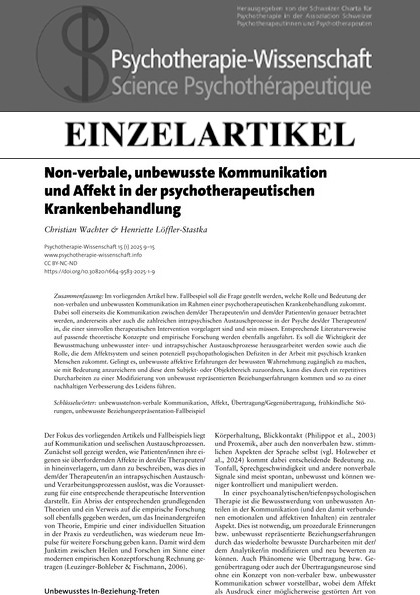Non-verbal, unconscious communication and affect in the psychotherapeutic treatment of patients
DOI:
https://doi.org/10.30820/1664-9583-2025-1-9Keywords:
unconscious/non-verbal communication, affect, transference/countertransference, early childhood disorders, unconscious relationship representationAbstract
In the present article or case study, the question is posed regarding the role and significance of non-verbal and unconscious communication within the context of psychotherapeutic treatment. On the one hand, the communication between the therapist and the patient will be examined more closely; on the other hand, the numerous intrapsychic exchange processes within the therapist’s psyche, which do and must precede meaningful therapeutic intervention, will also be considered. Relevant references to suitable theoretical concepts and empirical research will also be provided. The importance of raising awareness of unconscious interand intrapsychic exchange processes is to be highlighted, as well as the role played by the affect system and its potential psychopathological deficits in working with mentally ill individuals. If unconscious affective experiences can be made accessible to conscious perception, enriched with meaning, and assigned to the subject or object domain, this can, through repetitive working through, lead to a modification of unconsciously represented relational experiences, ultimately resulting in a lasting alleviation of suffering.
Downloads
How to Cite
Wachter, C., & Löffler-Stastka, H. (2025). Non-verbal, unconscious communication and affect in the psychotherapeutic treatment of patients. Psychotherapie-Wissenschaft, 15(1), 9–15. https://doi.org/10.30820/1664-9583-2025-1-9
Issue
Section
Special Issue
License

This work is licensed under a Creative Commons Attribution-NonCommercial-NoDerivatives 3.0 Unported License.
This journal provides open access to its content in accordance with the basic premise that the free public availability of research benefits the exchange of knowledge throughout the world.
Authors wishing to publish in this journal agree to the following:
- The author/s retain/s the copyrights and consent/s to initial publication of the work in the journal under a Creative Commons Attribution licence, which allows third parties to use the work by citing the name/s of the author/s and this journal as initial publisher (in accordance with the Creative Commons Attribution-NonCommercial-NoDerivs 3.0 DE-Licence).
- The author/s can enter into additional contracts for the non-exclusive distribution (e.g. publish in a collection or book) of the version published in the journal, if the journal is cited as initial publisher.


